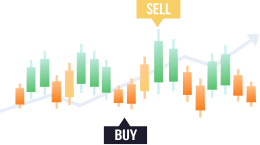Trading Conditions
- Home
- Education
- Trading Essentials
- Trading Conditions
Trading Conditions
Find out What Are Trying Conditions
and Why Are They Important
What Are Trading Conditions?
In general, trading conditions can be defined as all those conditions that a broker imposes on a trader and under which he is able to make trades. Most would agree that trading conditions are in large part related to the direct financial aspects of trading including broker’s margin and leverage options, commissions on trades, overnight fees, minimum and maximum order size, average trade execution speed, minimum trade size etc. But we can argue that trading conditions cover a much wider spectrum of elements such as minimum required deposits, number of trading instruments and assets that are available to traders, trading hours, deposit and withdrawal options, available trading platforms and their device compatibility etc.
For instance, a broker may offer MT4 trading platform, his own or a trading platform of another provider, yet choosing to trade with a particular broker would mean that the trader is compliant to trade via the provided platform, hence he is agreeing to a type of a condition under which he is going to trade. Why is this important? Because the platform performance can affect the trade execution speed hence make an important difference in profits and losses of your trades.
Therefore, as any and all trading conditions may lead to financial consequences, it is crucial for all traders to understand the brokers’ trading conditions in full, before opting to trade via a particular broker.
Key trading conditions to be aware of
Spreads
The spread stands for the difference between a buy and sell price and this difference must be paid upon closing the position. It is either going to be your profit or loss, but the narrower the spread is, the less the price actually needs to move in your favor before you can make profit, or for that matter a loss when it moves against you. Therefore, the lower the spreads that brokers are offering, the broker is becoming more competitive. Some brokers offer spreads as low as 0.0.
Average Execution Speed
Average execution speed refers to how fast the trade order is going to be executed once it is received by the broker. Faster execution means that your exposure to price shifts after you have placed your order is going to be lower. Some brokers offer execution speed of less than 40ms which reduces the risk of a price shift for traders to minimum. This is particularly important for those traders that are engaging in scalping trading strategies which are based on quick executions and generating small profits on each trade.
Services and Trading Conditions
Besides making sure the broker of your choice is regulated, you may also want to examine the services and trading conditions offered. Some brokers may offer very simple services, while others may include more sophisticated trading platforms and additional tools and analytical resources which can help you in making more informative, hence more successful trading decisions.
Minimum Deposit, Deposit and Withdrawal Fees
Each broker has a minimum deposit that a trader will need to make in order to start trading. This minimum deposit may vary between different account types of the same broker as well as between different brokers. Some of the brokers go as low as requiring $10 as initial deposit. In addition, traders should also pay attention to potential deposit and withdrawal fees/commissions which can vary from broker to broker (some may not have any fees), as well as from deposit and withdrawal options.
Commissions on Trades
With some brokers, for each trade you will make there is going to be a fee/commission which is calculated from the trade value or the full exposure of the position. These commissions may vary from anything between 0.01 to a few % depending on the broker, asset you’re trading, the monthly trading volume you are making etc. In addition, there may be a minimum commission charge if the size of the trade is not “big enough”. Traders should be extra careful with this side cost as its cumulative value can be significant.
Holding Costs or Overnight Fees
With some brokers, for each trade you will make there is going to be a fee/commission which is calculated from the trade value or the full exposure of the position. These commissions may vary from anything between 0.01 to a few % depending on the broker, asset you’re trading, the monthly trading volume you are making etc. In addition, there may be a minimum commission charge if the size of the trade is not “big enough”. Traders should be extra careful with this side cost as its cumulative value can be significant.
Why Are Trading Conditions so Important?
Understanding trading conditions is crucial for successful and profitable trading since it relates to financial aspects of it. All those obvious, less obvious and sometimes even “hidden” fees, costs and commissions may have a significant effect on traders’ profitability.

Trading conditions vary from broker to broker, as each of them can impose specific rules. This is one of the key areas on which they are competing for customers. Therefore, it is advisable that traders make a thorough check of brokers and compare their trading condition offers. Finally, you should know that each broker usually has several types of trading accounts and each is created with important differences in trading conditions. For instance, the minimum deposit for premium trading accounts may be 10 times higher than for a standard one, but the trader using premium account will usually receive better trading conditions as it is expected he will make a much higher trading volume.









 Bitcoin
Bitcoin  Ethereum
Ethereum  Tether
Tether  XRP
XRP  USDC
USDC  Solana
Solana  TRON
TRON  Figure Heloc
Figure Heloc  Lido Staked Ether
Lido Staked Ether